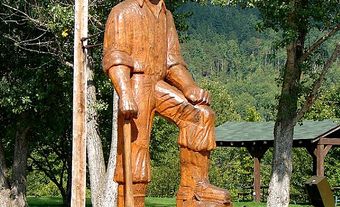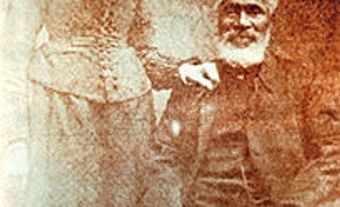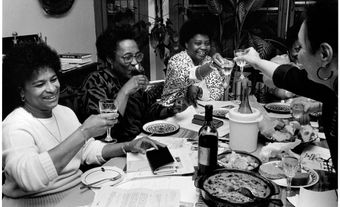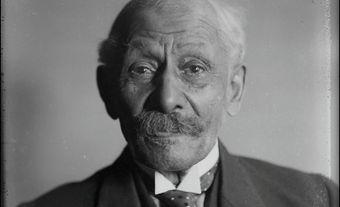Saint-Firmin Monestime, mayor of Mattawa, Ontario from 1964 to 1965 and 1970 to 1977, physician, national director of the Conservative Party (born 16 December 1909 in Cap-Haïtien, Haiti; died 27 October 1977 in Mattawa, Ontario). Monestime was the mayor of Mattawa and the very first elected Black mayor in Canada. He served under the banner of the Progressive Conservative Party. After obtaining his degree, he became the first physician of Haitian origin to practise in Ontario.

Family and Education
The only son of a tanner in Cap-Haïtien, Haiti, Saint-Firmin Monestime grew up alongside his six sisters in comfortable circumstances. The occupation of Haiti by the United States from 1915 to 1934 marked a large part of his childhood.
In 1931, at age 22, Monestime received his bachelor of arts degree from the Université d’État d’Haïti, in the Haitian capital of Port-au-Prince. He then taught history in the capital for a brief time. That same year, he began his studies at the university’s medical school, where he met François Duvalier, who became president of the Republic of Haiti in 1957 and led a dictatorial regime there until his death in 1971. Monestime received his medical degree in 1936.
A Dedicated Physician
Saint-Firmin Monestime specialized in rural medicine. The young physician’s first posting was as a military doctor, working along the international highway connecting Haiti to the Dominican Republic.
In the infamous “Parsley massacre” of 2 to 8 October 1937, at the orders of Dominican president Rafael Leónidas Trujillo Molina, an estimated 20,000 to 35,000 Haitians working on Dominican sugar-cane plantations were killed along the Dajabón River (also called Massacre River) separating the two countries. Monestime was the only doctor on hand. In 1943, in recognition of his efforts during this tragedy, he was named a Knight of the Haitian National Order of Honour and Merit, his country’s highest award.
In 1941, Monestime became director of the Haitian Ministry of Rural Medicine, based in Port-au-Prince. He published four books about the realities and medical needs of Haitians living in the country’s rural areas. At this time, he married Nelly Bonhomme, with whom he then had two children, Daniel and Marie-Eddie.
In the wake of his experiences, Dr. Monestime began to give lectures and to make statements criticizing Haitian government policy in the media. He resigned from his government position and then, fearing reprisals, quietly fled the country in 1945. (As he later explained, “In Haiti, quitting a government job makes you an enemy of the State. I feared for my life.”) Before his departure, Monestime and his wife divorced.
Immigration to Canada
Upon leaving Haiti, Saint-Firmin Monestime chose not to immigrate to the United States, both because of the racial segregation that still prevailed there and because, in reaction to the United States’ occupation of his country, he had always refused to learn English. (See also Racial Segregation of Black People in Canada.) At first, because he was francophone, he had thought about settling in France, but that country was still recovering from the Second World War and did not offer many opportunities. After obtaining his residency permit, he instead chose Quebec, thus becoming a member of the first waves of Haitian professionals and intellectuals to immigrate to this province (see Haitian Canadians). He arrived in Quebec City in 1945 without a cent to his name, and settled there.
In 1950, Monestime was offered a teaching position in Haiti, which he turned down. His medical training was not recognized in Canada, so he began medical studies at the University of Ottawa, completing them in 1951. He specialized in gynecology. His studies took him to Quebec City, Montreal, Sherbrooke and Edinburgh, in Scotland. After earning his degree, he became the very first Haitian physician to practise in Ontario, and one of the first to practise in Canada.
It was at this time that Monestime met his future wife, Zenaida (Zena) Petschersky, a Russian refugee who, fleeing the Nazi and communist regimes, had emigrated to Canada with her mother in 1949.
In August 1951, accompanied by his colleague, Dr. Gaston Lamontagne, Monestime began a drive to Timmins, Ontario, where they planned to open a medical practice. But along the way, they stopped for a meal at a restaurant called Chez François in the town of Mattawa in northeastern Ontario, just a kilometre from the Quebec border, in traditional Algonquin territory. At that time, Mattawa had a population of about 3,000, many of them Franco-Ontarian or Algonquin.
The restaurant’s owner recognized Monestime as the doctor who had treated him once in Ottawa. He told Monestime that Mattawa’s general hospital had been desperately looking for a new doctor since the town’s previous doctor had died. Charmed by the community of Mattawa, Monestime was persuaded to stay and take the job, while Lamontagne went on to Timmins.
Zena Petschersky joined Monestime in Mattawa, and the couple married in 1953. They had four children — a girl named Vala, and three boys, named Fedia, Sacha and Yura — and raised them all in Mattawa. At the time, Monestime and his family were the town’s only Black residents.
Doctor and Mayor of Mattawa
Saint-Firmin Monestime’s medical practice grew rapidly, and his dedication and kindness quickly made him a pillar of the community. At a time when the civil-rights movement was emerging in the United States and racial tensions were mounting, Monestime maintained an open attitude. (See also Anti-Black Racism in Canada.) He was also greatly esteemed by the area’s Algonquin community.
In 1957, Monestime became a Canadian citizen. Still driven by a strong sense of justice, he began taking an interest in politics. He was elected to the Mattawa town council in 1962. The following year (the same year that Dr. Martin Luther King gave his “I Have a Dream” speech) Monestime ran for mayor of Mattawa and won, thus becoming the first elected Black mayor in Canada. (See also William Peyton Hubbard.)

Monestime was re-elected mayor several times. However, from 1966 to 1967, he had to take time off to be treated for prostate cancer. He thought about running as a Progressive Conservative candidate for Member of Parliament, but decided instead to become a town councillor again in 1968. He was re-elected mayor in 1970 and held the position until his death. Throughout his political career, Monestime continued to work as a physician as well.
In 1971, he ran for the presidency of the Progressive Conservative Association of Canada, without success.
Monestime was dedicated to improving living conditions for his fellow citizens. His achievements as mayor included building social housing and carrying out several public-works projects, such as paving roads, lighting streets, and creating a park. His greatest project came to fruition in 1976 with the opening of the Algonquin Nursing Home, founded by Monestime and his wife after 12 years of bureaucratic wrangling. Until then, seniors from Mattawa had had to go far from home to receive care.
On 29 February 1976, Monestime’s 21-year-old son Fedia witnessed an altercation at the hotel in Mattawa, was shot in the stomach, and died on the way to the hospital, where his father was treating three other people who had been wounded in the incident. The shooter was subsequently charged with murder but acquitted—a verdict that Monestime denounced.
On 27 October 1977, at age 67, Monestime died of pancreatic cancer at the Mattawa Hospital, where he had worked for the past 25 years.

Legacy
In tribute to Monestime’s services to the province of Ontario, the Ontario government gave his name to a township northeast of Sault Ste. Marie, in 1974-75.
Today, the main street in Mattawa is unofficially known as Monestime Way, and the town council chamber has also been renamed in his honour. In 2004, the Mattawa Museum opened a permanent exhibit about him.
Since 2015, the University of Ottawa has awarded the Firmin Monestime Scholarship to Canadian students who are members of the Outaouais Haitian community or who graduated from secondary school in Mattawa.
Awards and Honours
Knight of the Haitian National Order of Honour and Merit, 1943

 Share on Facebook
Share on Facebook Share on X
Share on X Share by Email
Share by Email Share on Google Classroom
Share on Google Classroom



